Five Amtrak Destinations for Exploring the South by Train and Trail
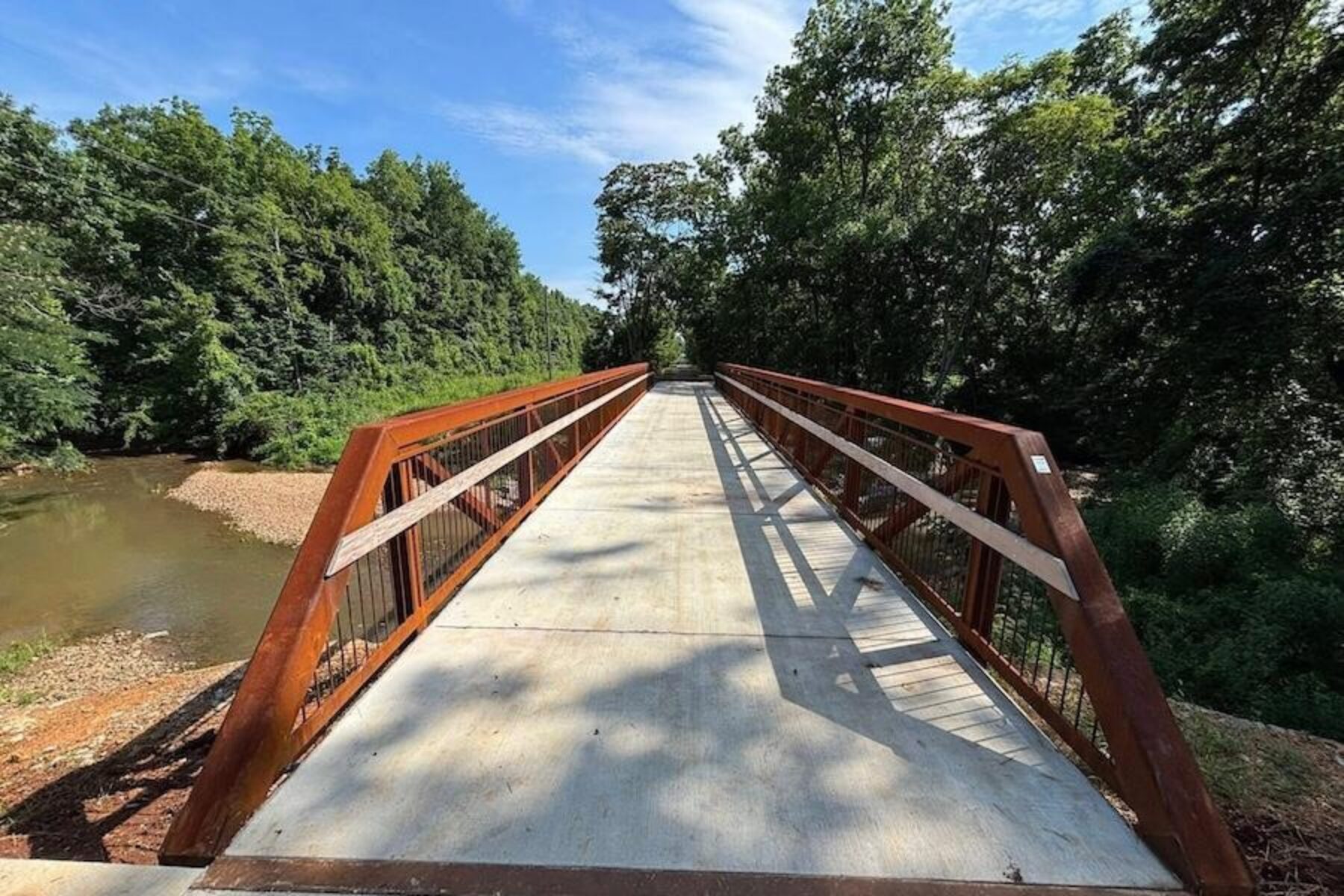
In 2025, Amtrak had its highest ridership on record, with riders logging 34.5 million trips. America’s national passenger rail company serves more than 500 stations spread across 46 states, but some may not know that many of these stops are within just a short walk or ride of long-distance rail-trails. Here are five stations in the South that are less than a mile or two away from a rail-trail that’s 20 miles or longer. Even better, each town has plenty to offer when it’s time to come off the trail.
Note: Amtrak allows bikes on most of its routes, including all of the ones mentioned in this article, but an advance reservation may be required. Before traveling, be sure to confirm; learn more about Amtrak’s bicycle policies on their website.
J. Ed Morgan Intermodal Facility in Hattiesburg, Mississippi
Trail: Longleaf Trace
Amtrak route: Crescent (New Orleans to New York)
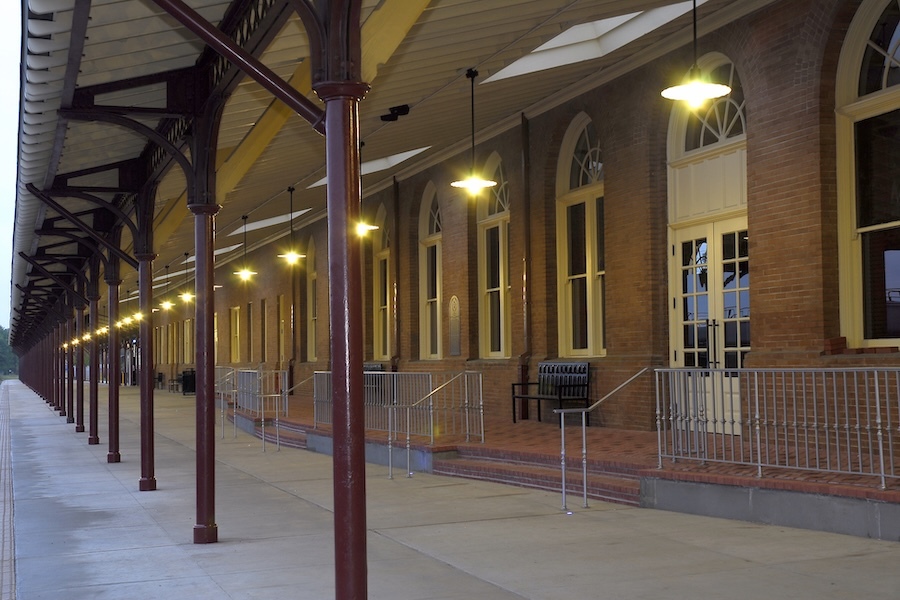
Hattiesburg, Mississippi’s third-largest city and home to two colleges, is nicknamed the Hub City in tribute to its central location between New Orleans, Jackson and Mobile. Though the town no longer sees loads of timber passing through day and night, it has in recent years reinvented itself as a hub of arts and culture.
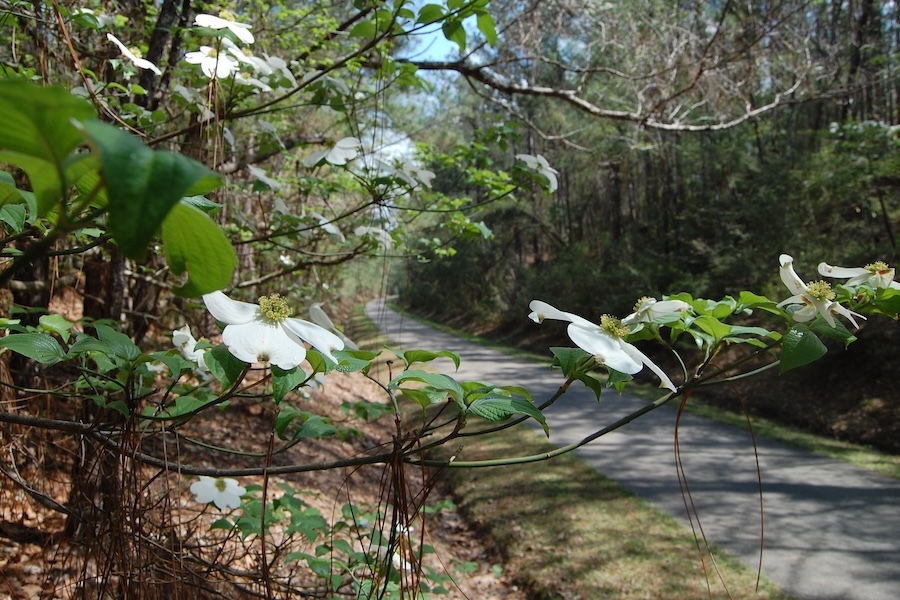
The city’s grand, 14,000-square-foot Italian Renaissance-style passenger depot was constructed in 1910 and is one of the oldest in the state. The scenic 44-mile Longleaf Trace rail-trail begins less than a mile from the station and runs northwest to downtown Prentiss, Mississippi, on the railbed of the former Mississippi Central Railroad.
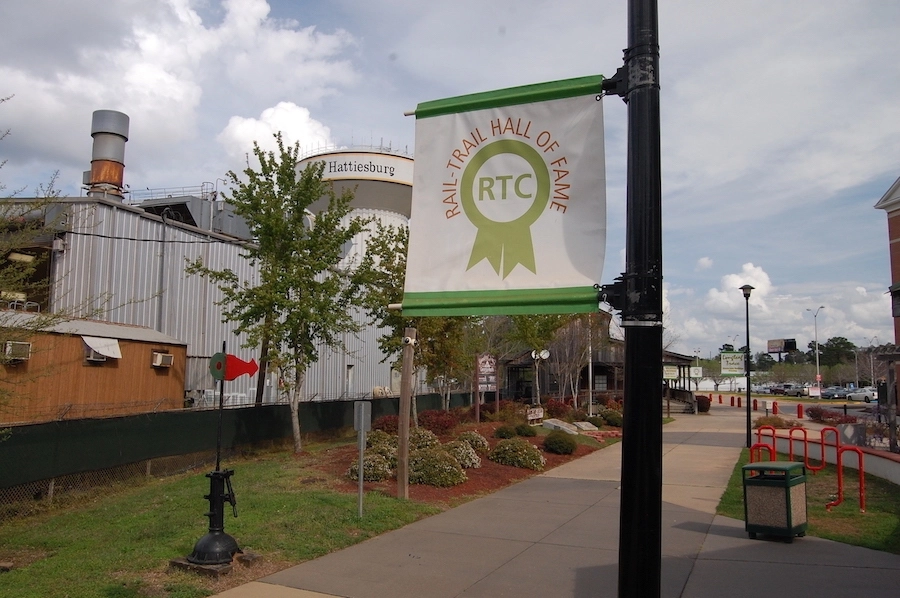
Hub City highlights include the African American Military History Museum (less than a mile from the station), the Art Deco Saenger Theater and the quirky Hattiesburg Pocket Museum, a rotating art exhibit in an alley that opened during the Covid-19 pandemic and has built a cult following ever since. Markers to the Mississippi Blues Trail, Mississippi Country Music Trail and Roots of Rock ‘n’ Roll are spread throughout town, reminding visitors of the city’s important influence on American music. Grab a snack at the Cattiesburg Cat Cafe, where you can sit with a group of friendly (and adoptable) felines.
Rentals: Bikes can be rented at the James Lynn Cartlidge Longleaf Trace Gateway at Mile Marker 3 (2895 W. Fourth St. Hattiesburg).
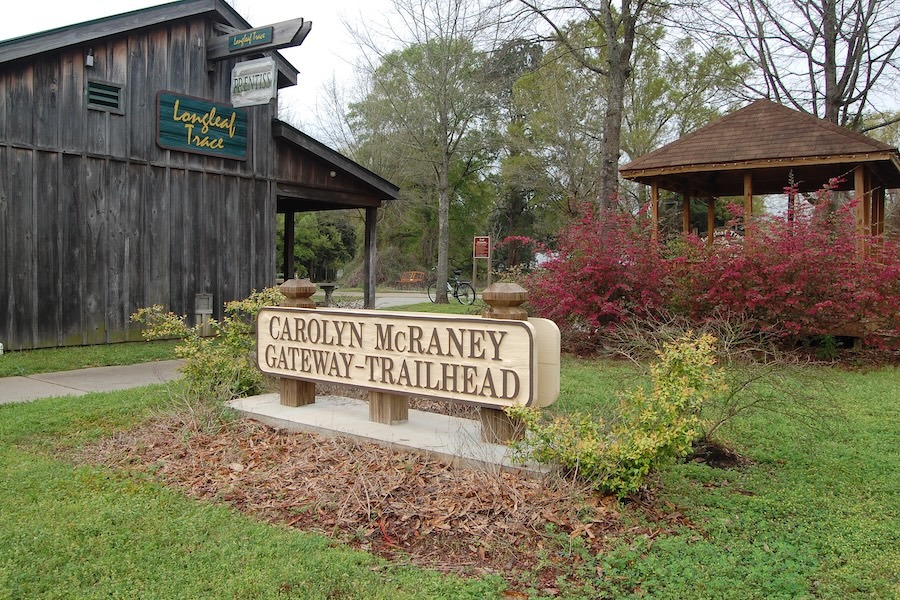
Greenville Train Station in Greenville, South Carolina
Trail: Prisma Health Swamp Rabbit Trail Network
Amtrak Route: Crescent (New Orleans to New York)
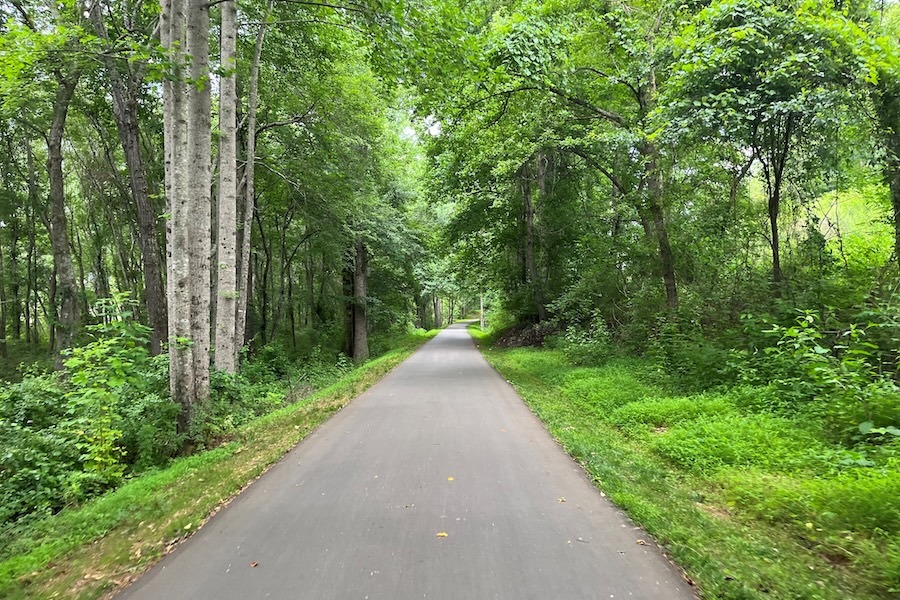
Greenville’s utilitarian train station admittedly isn’t much to look at, but it’s less than half a mile from the 28-mile Prisma Health Swamp Rabbit Trail Network, making car-free travel around this thriving section of the South Carolina upstate a cinch. The popular path, following the former Greenville & Northern Railway, begins in a pastoral section of the now-trendy former textile town of Travelers Rest, runs directly through Greenville’s booming downtown and ends a few miles south. Along the way, it passes the Furman University campus and along the banks of Reedy Falls, a series of cascades on the Reedy River smack-dab in the middle of the city’s commercial district. Continue down one of the trail’s spurs to extend your adventure for another 10 miles or so.
After years of declining population, Greenville saw its fortunes begin to turn in 1994 with the arrival of BMW’s first American assembly plant in nearby Greer. Today, the city boasts the kinds of amenities that could rival cities two or three times its size (about 74,000), including multiple James Beard Foundation Award-winning restaurants, minor league hockey and baseball, and a performing arts center, the Peace Center, with enough capacity to host traveling Broadway shows. For kids, there’s the Children’s Museum of the Upstate, Greenville Zoo and Flying Rabbit Adventures ropes course (adults allowed, too!).
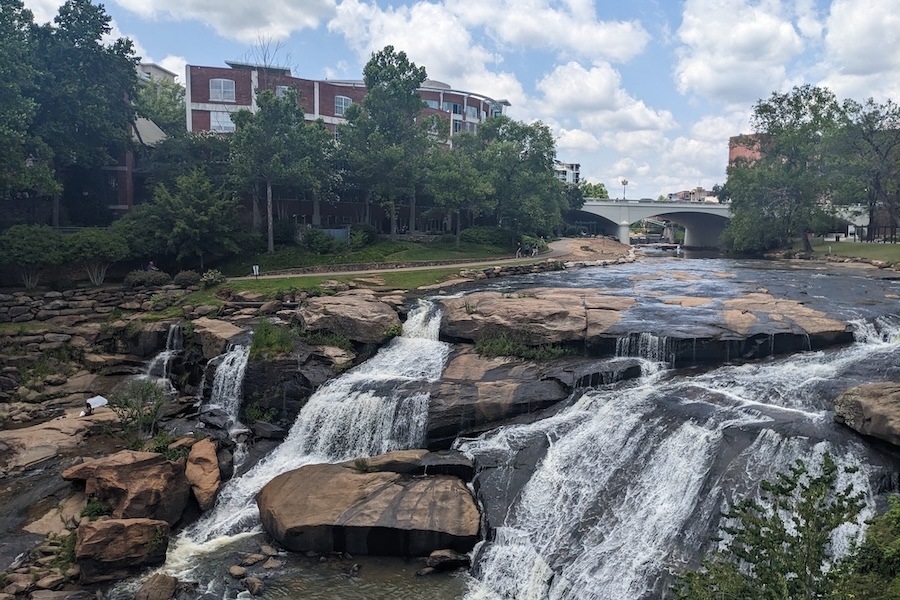
Rentals: Those looking for bike rentals have several choices: Reedy Rides (2 S. Richardson St., Greenville; 864.419.2944), right downtown and just a few blocks north of the trail; Greenville Bike & Tri (123 Welborn St. #102, Greenville; 864.331.8483), just off the trail and conveniently located next to a brewery, coffee shop and BBQ spot; and Greenville BCycle, the city’s public bikeshare with 12 locations around downtown.

Durham Station in Durham, North Carolina
Trail: American Tobacco Trail
Amtrak routes:
- Carolinian (Charlotte to New York City)
- Piedmont (Charlotte to Raleigh)
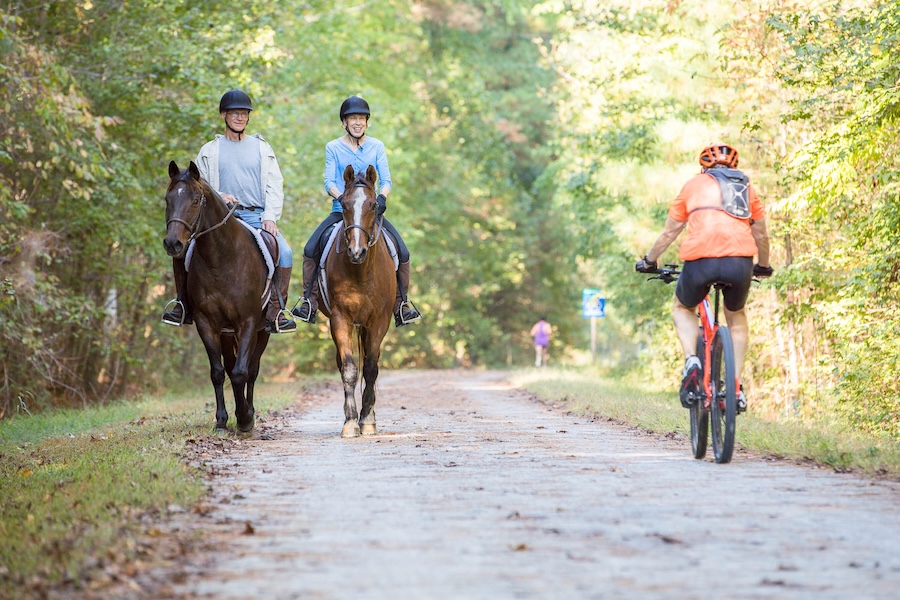
It’s fitting that the Amtrak station closest to the 22-mile American Tobacco Trail is housed in a former warehouse for the American Tobacco Company. The redbrick Italianate building has an elegance design constructed in 1897 with parapets and corbeled pendants (architecture buffs, take note!). In 2009, the building was converted to an Amtrak station, and it is now part of the city’s Brightleaf National Historic District, a 34-acre area in the heart of downtown.
The American Tobacco Trail starts less than a mile south of the historic station, passing through three counties on the way to its terminus on the outskirts of Apex, a growing Research Triangle suburb.

Back in Durham, explore all things Duke-related, including the 55-acre Sarah P. Duke Gardens, Nasher Museum of Art at Duke University, and the sprawling Blue Devils campus. Durham Bulls Athletic Park, home to arguably the most famous Triple-A baseball team of all-time, is only half a mile from the train station. Check out bustling Ninth Street for a variety of eclectic and international food options and bars.
Rentals: Bullseye Bicycle (102 Morris St., Durham; 919.438.3883) is across the street from the Amtrak station, while Durham Cycles (756 Ninth St., Durham; 919.251.8103) sits just blocks from the Duke University Campus.
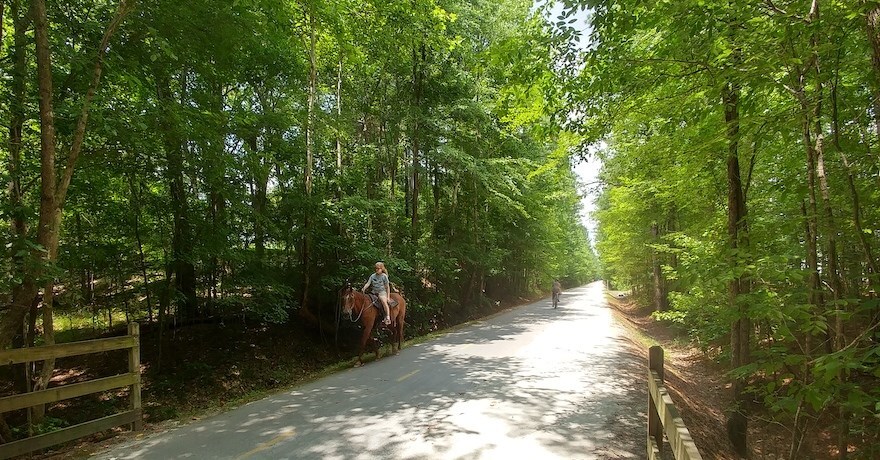
Anniston Intermodal Train Station in Anniston, Alabama
Trail: Chief Ladiga Trail
Amtrak route: Crescent (New Orleans to New York)

For those who can’t wait to hit the trail, Anniston, Alabama, may be just the ticket with access to the storied Chief Ladiga Trail just a few hundred yards from the train station’s front doors. The 39.5-mile path was Alabama’s first rail-trail conversion and an inductee in Rails to Trails Conservancy’s Hall of Fame.

The nature-immersed trail passes through Talladega National Forest and the Southern Appalachian Foothills and offers views of Alabama’s two highest peaks: Duggar Mountain and Mount Cheaha. At the trail’s eastern terminus, on the Alabama-Georgia state line, you can also connect directly with the Silver Comet Trail and ride for another 61.5 miles east to Smyrna, an Atlanta suburb.
If you decide to spend time in Anniston, this cozy northeast Alabama town, stop by Top O’ The River, a regional mini-chain, for fried seafood and a wide variety of margaritas, or Coldwater Mountain Brewpub for a Freewheeler Blonde Ale and other cycling-inspired brews. The small but impressive Natural History Museum includes Egyptian mummies from the Ptolemaic era and the oldest set of bird dioramas in the United States. If you’re into more eccentric offerings, you can visit the World’s Largest Office Chair on Noble Street.
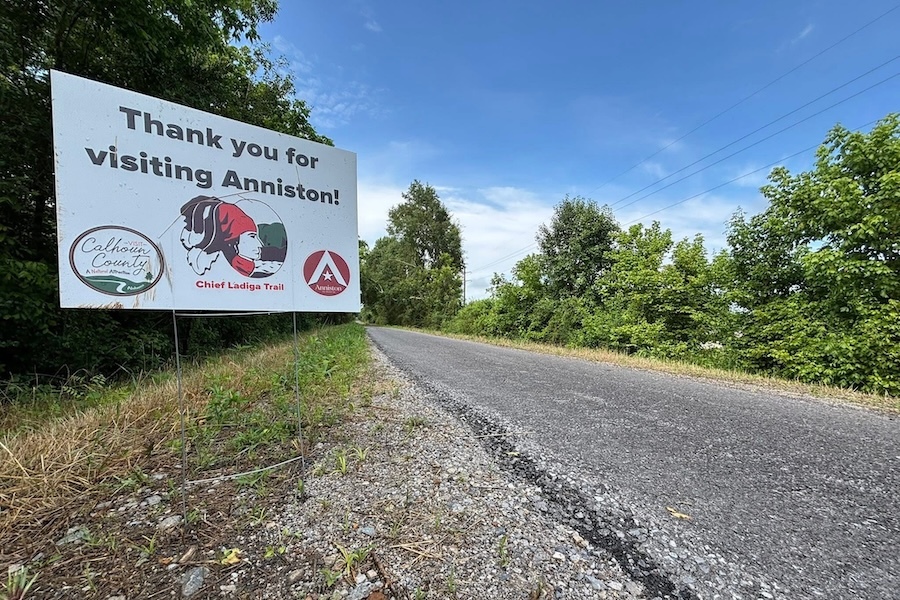
Rentals: Wig’s Wheels (1229 Noble St., Anniston; 256.237.9447) is less than a mile from the Anniston Amtrak station and less than half a mile from the Chief Ladiga Trail.
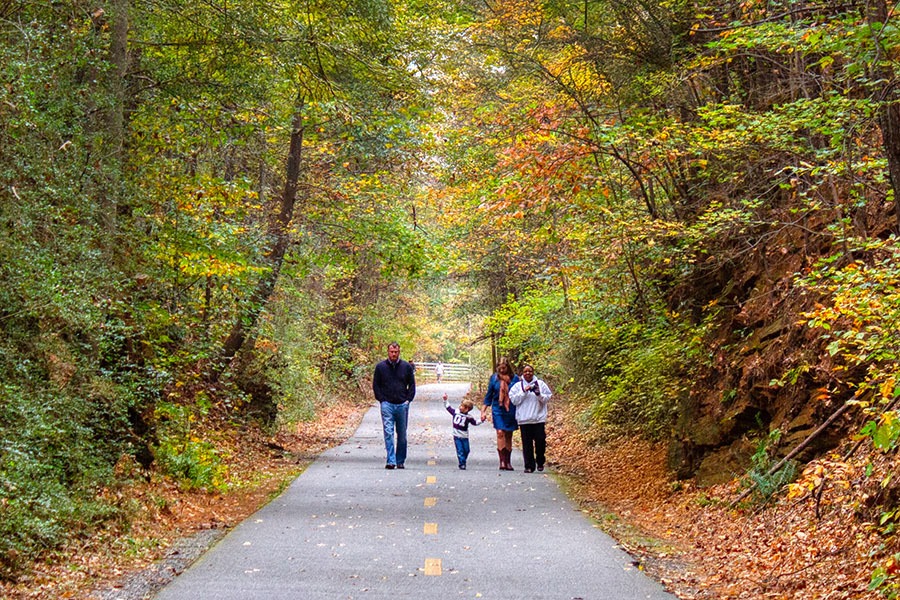
Union Passenger Terminal in New Orleans, Louisiana
Trail: Mississippi River Trail
Amtrak routes:
- Crescent (New Orleans to New York)
- Mardi Gras (New Orleans to Mobile)
- Sunset Limited (New Orleans to Los Angeles)
- City of New Orleans (New Orleans to Chicago)

When Hurricane Katrina struck in 2005, it destroyed or damaged much of the railway along the Gulf Coast, forcing Amtrak’s Sunset Limited route, running between Los Angeles and Miami, to terminate in New Orleans. While the Big Easy is hardly a bad place to be stuck, Gulf residents celebrated last August when twice-daily service between New Orleans and Mobile, Alabama, was finally restored. Ridership on the aptly named Mardi Gras Service has already doubled its projections.
Unlike many other stations whose busiest days are behind them, Union Passenger Terminal remains a very active place. In addition to serving as the terminus for four Amtrak routes, it also hosts various intercity buses (such as Greyhound) and is the central station for NORTA, New Orleans’s bus and streetcar system. In the waiting area, there is a dramatic 250-foot-long mural depicting 400 years of Louisiana history. The muralist, Conrad Albrizio, was commissioned in 1951 by the Works Progress Administration to create the work.
The massive 80-mile Mississippi River Trail system is technically less than 2 miles away from Union Passenger Terminal, but cycling to it directly from the station will force you to ride over the Crescent City Connection bridge, which doesn’t have a dedicated bike lane (nor do any of the city’s other bridges that cross the Mississippi). The safer—and let’s be honest, far more fun—option is to ride up to the Canal Street Ferry Terminal, less than 1.5 miles from Union Passenger Terminal, and hop on the 30-minute bike-friendly ferry. The dock of the arrival terminal is just several hundred feet from one of the trail segments.
Much like its namesake, the Mississippi River Trail system meanders along the river, running atop several levees and through several parishes. Note that several sections of the system are physically disconnected so, if you expect to ride much of it, advance planning is highly recommended. The longest unbroken section begins in Audubon Park in New Orleans (on the north bank of the river) and runs 20+ miles to the Bonnet Carré Spillway.
Rentals: There are several bike rental shops within a mile of Union Passenger Terminal, but the closest is Arts District Bikes (1121 Margaret Pl., New Orleans; 504.521.6390), which offers light-up bikes with cup holders. For quicker trips, the city’s Blue Bikes bike share is another option.
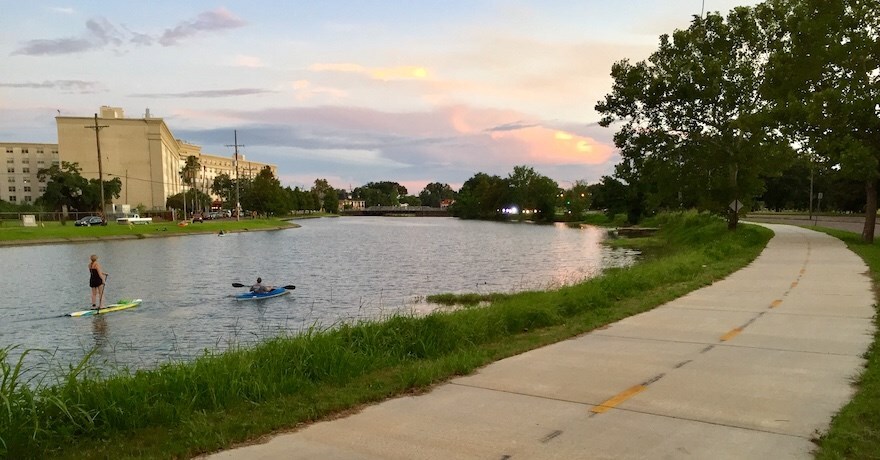

Donate
Everyone deserves access to safe ways to walk, bike, and be active outdoors.


